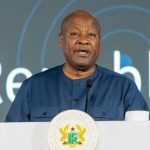Dr. Mustapha Abdul-Hamid, the President of the African Refiners and Distributors Association (ARDA) and Chief Executive of the National Petroleum Authority (NPA), has called for a fundamental shift in how Africa handles its crude oil pricing.
Speaking at the African Energy Week in Cape Town, South Africa, Dr. Abdul-Hamid urged all 54 African nations to end the practice of dollar-denominated pricing for crude oil, a system he believes is contributing to economic instability across the continent.

Dr. Abdul-Hamid emphasized the need for African countries to develop integrated infrastructure that would allow them to achieve energy security independent of foreign powers.
He argued that by reducing reliance on foreign currencies, African nations could reduce the high costs of energy imports, better manage the volatility of oil prices, and avoid the destabilizing effects of international sanctions and supply disruptions.
The ARDA President also proposed a halt to the export of crude oil from Africa, stressing that the continent should focus on refining its own natural resources rather than selling raw crude oil to be processed abroad and then importing the finished products at a premium. He noted that this cycle weakens local economies and the energy security of the continent.
Dr. Abdul-Hamid elaborated that Africa has the capacity to refine its own crude oil and meet the growing energy needs of its population.
He pointed out that while refined products are what power industries, transportation, and economies, Africa continues to export its crude oil only to re-import refined products.
“Nobody puts crude oil in their vehicle or airplane – everything that generates movement and wealth is a refined product,” he said. He further stressed the need for collaboration between Africa’s upstream (oil extraction) and downstream (refining) sectors to fully unlock the continent’s potential.
In his vision for Africa’s energy future, Dr. Abdul-Hamid proposed a three-tier strategy to drive the continent’s energy independence.
First, he called for policy harmonization across African nations to standardize fuel specifications, which vary widely from country to country.
For instance, while Ghana limits sulfur in fuel to 50 parts per million (ppm), neighboring West African countries allow up to 3,000 ppm, making cross-border trade of petroleum products costly and inefficient.
He argued that without harmonized standards, intra-continental trade remains difficult, limiting Africa’s ability to collaborate and optimize its energy sector.
The second aspect of Dr. Abdul-Hamid’s strategy was infrastructure integration.
He called for African countries to build stronger regional infrastructure, including pipelines, refineries, and storage facilities, to reduce the dependency on external markets and secure energy supplies within the continent.
Dr. Abdul-Hamid noted that Ghana’s local policies, such as requiring companies to use domestically refined fuel for oil extraction machinery, could be expanded to support regional refinery capacity and ensure that Africa fully benefits from its natural resources.
Finally, Dr. Abdul-Hamid advocated for the creation of a regional currency within Africa to further mitigate the pressures caused by reliance on the U.S. dollar for energy transactions.
He explained that the cost of importing refined petroleum products is significant and places continuous pressure on local currencies like the Ghanaian Cedi. A shared currency, he suggested, would provide stability and ease trade across African nations.
Other experts at the event echoed Dr. Abdul-Hamid’s calls for a more self-sufficient and sustainable energy approach for Africa. Omar Farouk Ibrahim, Secretary-General of the African Petroleum Producers Organisation (APPO), warned that Africa’s dependence on foreign markets for energy left the continent vulnerable to external shocks.
He emphasized the need for regional collaboration and investment in domestic energy infrastructure.
Riverson Oppong, Chief Executive of the Association of Oil and Gas Marketing Companies, also pointed out Africa’s paradox of exporting crude oil while lacking refined products for local consumption.
He highlighted that nearly 90 percent of Africa’s crude oil is exported, only for the continent to re-import refined products at a higher cost.
Oppong called for African nations to invest in local refining capabilities, which would not only boost energy security but also create jobs and economic growth within the continent.
Dr. Abdul-Hamid’s statements mark a pivotal moment in the ongoing discourse about Africa’s energy future.
By addressing these critical issues, he believes that the continent can pave the way for a more resilient and self-sustaining energy sector that will foster long-term economic stability and security for its people.






















































![[FREE FREE MONEY] Predict and Win a Guaranteed GH¢200 From Us EVERY WEEK](https://wordpress.ghanatalksradio.com/wp-content/uploads/2022/02/Predict-and-Win-Final-09-03-2021-218x150.jpg)
![[Predict & Win – 8th/Oct.] WIN A Guaranteed ¢200 From Us This Week](https://wordpress.ghanatalksradio.com/wp-content/uploads/2021/10/maxresdefault-16-218x150.jpg)
![[Predict & Win – 2nd] WIN A Guaranteed ¢200 From Us This Week](https://wordpress.ghanatalksradio.com/wp-content/uploads/2021/09/maxresdefault-50-218x150.jpg)
![[Predict & Win – 25th] WIN A Guaranteed ¢200 From Us This Week](https://wordpress.ghanatalksradio.com/wp-content/uploads/2021/09/maxresdefault-36-218x150.jpg)
![[Predict & Win – 18th] WIN A Guaranteed ¢200 From Us This Week](https://wordpress.ghanatalksradio.com/wp-content/uploads/2021/09/maxresdefault-23-218x150.jpg)







![[National cathedral] See full list of churches that have contributed since 2018](https://wordpress.ghanatalksradio.com/wp-content/uploads/2020/09/Ghana-National-Cathedral-GhanaTalksRadio-100x70.jpg)



